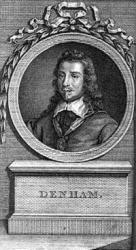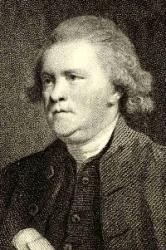Planning worship?
Check out our sister site, ZeteoSearch.org,
for 20+ additional resources related to your search.
- |
User Links
Person Results
‹ Return to hymnal


Export as CSV
John Buttress
Hymnal Number: d105 Author of "Hail, sacred truth, whose piercing rays" in Cantica Laudis
John Buttress
Richard Burdsall
1735 - 1824 Hymnal Number: d293 Author of "The voice of free grace cries escape" in Cantica Laudis Burdsall, Richard, for many years a Wesleyan minister, was born in 1735, and died in 1824. To his Memoirs, published at York, n.d., is appended a hymn beginning, "Now Christ He is risen, the Serpent's head is bruised." The hymn “The voice of free grace cries—'Escape to the mountain,'" begins with stanza ii. of this hymn, but with alterations. In some American hymnals, including Hatfield's Church Hymn Book, 1872, Burdsall's two stanzas are expanded into five, but by whom we cannot say.
--John Julian, Dictionary of Hymnology, Appendix, Part II (1907)
Richard Burdsall
William Kingsbury
1744 - 1818 Hymnal Number: d152 Author of "Let us awake our joys" in Cantica Laudis Born: July 12, 1744, Bishopsgate Street, London, England.
Christened: August 12, 1744, Poultry Chapel, Camomile Street Independent Church, London, England.
Died: February 18, 1818, Caversham, Southampton, England.
Kingsbury, William, was born in 1744, educated at an Independent academy in London, and became Pastor of the ancient Congregational Church, Above Bar, in Southampton, where he died in 1818, after an honourable and useful ministry of fifty-four years. He was the author of several published sermons and pamphlets, including:—(1) A Sermon on the King's recovery, 1780; (2) The Manner in which Protestant Dissenters perform Public Worship represented and vindicated, 1796; (3) An Apology for Village Preachers, 1799; (4) A Funeral Sermon on the Death of the Rev. Mr. Towle, 1807, &c.
Kingsbury was one of the ministers under whose patronage Dobell published his New Selection, 1806, and to that book contributed two hymns.-—"Great Lord of all thy churches, hear!" No. 213 (Divine Worship), and "Let us awake our joys," No. 100 (Jesus the King). Both these hymns are in common use, the second being specially popular in America. [Rev. W. R. Stevenson, M.A.]
--John Julian, Dictionary of Hymnology (1907)
William Kingsbury
John Bowdler
1783 - 1815 Hymnal Number: d161 Author of "Lord, before thy throne we bend Now to" in Cantica Laudis John Bowlder was born in London, in 1783. He was educated at Winchester College, and entered the legal profession. As a barrister, he gave unusual promise of eminence; but died in 1815, at the age of thirty-two. His miscellaneous writings were published in 1816, by his father, under the title of "Select Pieces of Prose and Verse."
--Annotations of the Hymnal, Charles Hutchins, M.A., 1872.
=================================
Bowdler, John, born in London, Feb. 4, 1783, and educated at the Sevenoaks Grammar School, and Winchester. In 1807 he was called to the Bar, but ill-health necessitated his residence abroad for a short time. On his return he resumed the duties of his profession. His weakness, however, increased, and gradually sinking, he died Feb. 1, 1815. He was a person of more than usual parts, and gained the friendship of Macauluy, Wilberforce, and other men of eminence. In 1816 his Select Pieces in Verse and Prose, were published by his father with a brief Memoir, Lond., G. Davidson. The two vols. contain essays, reviews, poetical pieces, versions of 4 Psalms, and 6 hymns. Of his hymns and Psalm versions nearly all are in common use. The best of these are, “As panting in the sultry beam"; “Children of God, who pacing slow;" and "Lord, before Thy throne we bend." The rest include: —
1. Beyond the dark and stormy bound. Heaven. This is a part of his hymn on the Sabbath. The ori¬ginal begins "When God from dust created man," is in 10 stanzas of 6 lines, and dated 1812.
2. Children of God, who pacing [faint and] slow. Encouragement.
3. Lord, before Thy throne we bend. Ps. cxx. 3.
4. 0 fcod, my heart within me faints. Ps. xlii.
5. Sing to the Lord with cheerful voice. Praise. Entitled "Thankfulness," and dated "Jan. 1814."
6. To heaven I lift mine eyes. Ps. cxxi.
-- John Julian, Dictionary of Hymnology (1907)
John Bowdler
John Killinghall
1640 - 1740 Hymnal Number: d131 Author of "In every trouble, sharp and strong" in Cantica Laudis Killinghall, John. The date of his birth is unknown. He was admitted pastor of a congregation at Beccles, Suffolk, Oct. 13, 1697. Through some indiscretion of conduct he retired from the ministry for a time. Subsequently, about 1702, he became the pastor of the Congregational Church, Southwark, then meeting in Deadman's Place (the Church of the Pilgrim Fathers). He died Jan. 1740. His memoir is included in the Brief Record of the Independent Church at Beccles, 1838, by S. W. Rix. (Miller's Singers & Songs, 1869, p. 156.) His hymn:—
In all my troubles, sharp and long (Joy in Affliction) appeared in the Life of Faith exemplified and recommended in a Letter found in the Study of the Rev. Joseph Belcher, late of Dedham, in New England, since his Decease. An Answer to this question, "How to live in this World so as to live in Heaven?” To which is added a few Verses by the late Rev. Killinghall, upon reading of it. London. 1741. It is in 3 stanzas. of 4 lines, and is found in modern hymn-books in the following forms:—(1) "In all my troubles, sharp and strong," in Reed's Hymn Book, 1842, and others; (2) "In every trouble, sharp and strong," in several collections, including the Enlarged London Hymn Book, 1873, &c.; and (3) "In every trying hour," in several American books, as Songs for the Sanctuary, N. Y., 1865, &c. In several of the older collections this hymn is attributed to "Coombes"— why we know not.
--John Julian, Dictionary of Hymnology (1907)
.
John Killinghall
Samuel Boyce
Hymnal Number: d362 Author of "Ye trembling captives, hear The gospel trumpet sounds" in Cantica Laudis Boyce. Twenty-one hymns appeared under this signature in Williams and Boden's Collection of above Six Hundred Hymns, &c, 1801. The writer is sometimes described as "Samuel Boyce"; but nothing definite is known to us concerning him. Of these hymns the following are in common use:—
1. All hail, redeeming Lord. Christ the Day-Spring.
2. Grace, how melodious is the sound. Fulness of Grace.
3. Great Sovereign Lord, what human eye. Harvest.
4. 0 the transcendent love. Christ the Sinner's Friend.
5. Ye trembling captives, hear. The Gospel Trumpet.
-- John Julian, Dictionary of Hymnology (1907)
Samuel Boyce
John Denham

1615 - 1668 Hymnal Number: d98 Author of "Great is the Lord, what tongue can frame [tell]" in Cantica Laudis Denham, Sir John, only son of Sir John Denham, Chief Baron of the Exchequer, and afterwards Chief Justice of the King's Bench, Ireland, born in Dublin, 1615, and educated at Trinity College, Oxford. In 1641 he was made governor of Fareham Castle for Charles I., and subsequently attended Charles II. in his exile. At the Restoration he was rewarded for his devotion to the Crown, and created a Knight of the Bath. Died in London, 1668, and was buried in Westminster Abbey. His poem, Cooper's Hill, is well known. The manly energy and nervous force of his verse was much more popular with Pope and Johnson and the 18th century school, than it is at the present time. His Version of the Psalms was written about 1668, but not published until 1714.
-- John Julian, Dictionary of Hymnology (1907)
John Denham
William Mason

1725 - 1797 Hymnal Number: d2 Author of "Again returns the day of holy rest" in Cantica Laudis Mason, William, M.A., was born at Kingston-upon-Hull, 1725, and educated at St. John's College, Cambridge. He was some time a Fellow of Pembroke Hall. On taking Holy Orders he became Rector of Aston, and Precentor of York Minster. He died April 5, 1797. His poetical writings, including Poems, Tragedies, Odes, and Hymns, published at intervals, were collected and issued in 4 vols. in 1811 as The Works of William Mason, M.A., Precentor of York, and Rector of Aston. His hymns, few in number, include, "Again the day returns of holy rest”; "Soon shall the evening star with silver [silent] ray", &c. These are in vol. i. of his Works.
-- John Julian, Dictionary of Hymnology (1907)
=======================
Born: February 12, 1725, Kingston-upon-Hull, England.
Died: April 7, 1797, Aston, England. There is a plaque to his memory in Poet’s Corner, Westminster Abbey (next to Milton), with a bas relief image of him.
Pseudonym: Malcolm MacGregor.
Mason was educated at St. John’s College, Cambridge, and became fellow of Pembroke College in 1749. After taking Holy Orders, he became Rector of Aston (near Rotherham), Yorkshire, in 1754. He was appointed Prebend of Holme in York Minster in 1756, Canon Residentiary in 1762, became Precentor and Prebendary of Driffield in 1763. He also served as literary executor for poet Thomas Gray. His works include:
Musaeus, 1744 (a lament for Alexander Pope, in the style of Lycidas)
Isis, 1748
Elfrida, 1752
Odes, 1756
Caractacus, 1759
The English Garden, 1772, 1777, 1779 and 1782
An Heroic Epistle to Sir William Chambers, 1774
Ode to Mr. Pinchbeck, 1776
Epistle to Dr. Shebbeare, 1777
Essay, Historical and Critical, of Church Music, 1795
Sappho, 1797
Sources:
Julian, p. 717
Robinson, p. 35
http://www.hymntime.com/tch/bio/m/a/s/mason_w2.htm
========================
http://en.wikipedia.org/wiki/William_Mason_%28poet%29
William Mason
W. Wrangham
Hymnal Number: d1 Author of "According to Thy word, Let me Thy mercy prove" in Cantica Laudis Wrangham, W., p. 930. ii., 223. From his New Metrical Version of the Psalms, 1829, the following are in common use in America:— (1) "Eternal God, celestial King," Psalms Ivii; (2) "Praise the Lord, His power confess," Psalms cl.; (3) “To Thee, my righteous King and Lord," Psalms ciii.
--John Julian, Dictionary of Hymnology, Appendix, Part II (1907)
W. Wrangham


 My Starred Hymns
My Starred Hymns


